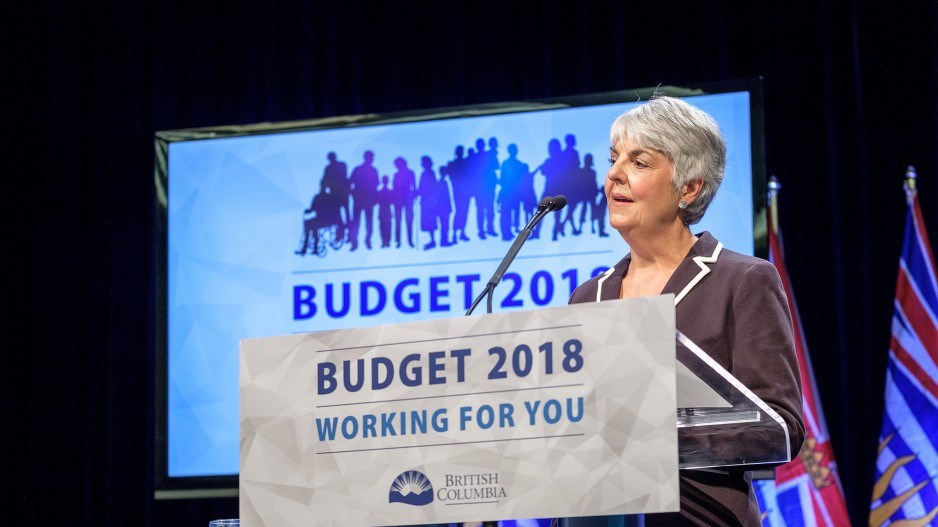Tax competitiveness is a top priority for B.C. business leaders – and they want to see it accounted for in the province’s next budget.
“Capital is mobile – I mean, I sound like a lot of other business sectors, but it’s just so true,” said Jonathan Rhone, chair of the BC Cleantech CEO Alliance and president and CEO of Axine Water Technologies Inc.
“We need to raise billions of dollars to realize our full potential in B.C., to continue to create B.C. as a world centre for clean-tech innovation,” he said, adding that the industry relies heavily on foreign direct investment.
“We’re increasingly hearing from CEOs and investors that they’re increasingly concerned about our tax competitiveness.”
On February 19, Finance Minister Carole James will table her second full budget. The first one introduced record-breaking investments in housing and health care, along with new and higher taxes to cover some of the costs.
“We’re looking for a business-friendly budget,” said Surrey Board of Trade CEO Anita Huberman, adding that the government’s new employer health tax (EHT) will set up a roadblock to doing business in the community. This year, certain businesses will pay the EHT plus partially phased out Medical Services Plan premiums, a double dip the Greater Vancouver Board of Trade (GVBOT) has urged government to lift.
The GVBOT would like to see a fiscal plan to preserve the province’s budget as B.C. follows through on significant public spending commitments.
“Incentives are great, but I think there needs to be some reductions in taxes,” Huberman said.
Second to trimming tax rates altogether, Business Council of BC (BCBC) chief economist Ken Peacock would like to see government address the threshold at which the province’s top marginal income tax rate kicks in. Earners currently pay 16.8% on income above $153,000.
“People living in Alberta can make twice as much before they start paying the top marginal tax rate in that province,” Peacock said. He said that has implications for B.C. businesses’ ability to compete for talent with neighbouring jurisdictions such as Washington state, where workers don’t pay state-level personal income tax.
Builders would like to see development land tax exemptions. Anne McMullin, president and CEO of the Urban Development Institute’s Pacific region, says a provincial sales tax rebate on construction materials and a property transfer tax rebate on multi-family apartments for rentals would help address some of the development industry’s challenges, which have been exacerbated by rising interest rates and the high cost of land in Greater Vancouver.
“Construction costs have gone up about 10% in the last year. It’s becoming almost unviable to build,” she said.
B.C.’s mining industry will be watching for how the budget supports the 25 recommendations put forward by the government’s B.C. Mining Jobs Task Force, which have been publicly accepted by Premier John Horgan.
“That actually is a really big statement,” said Bryan Cox, president and CEO of the Mining Association of BC. At the federal level, Cox will be looking for information on the government’s national Minerals and Metals Plan, which is expected later this year.
“What we’re looking for is some more meat around that program and sort of signalling as to how that’s going to work.”
An Ernst & Young LLP report provided to the task force noted that the province’s carbon tax poses a challenge to its fiscal policy competitiveness.
The CleanBC program announced in Budget 2018 directs a portion of carbon tax paid by industry into incentives for clean operations, but Peacock said it’s still a double hit for energy-intensive exporters – it’s the highest carbon tax in North America, and no longer revenue neutral.
“It would be very, very beneficial to the province as a whole, we think, and to the export sector in particular, if they provided some relief,” he said.
Business leaders aren’t just turning to B.C. for tax relief. The federal government could, for example, raise the qualifying threshold on its top marginal tax rate. It could lower rates. It could offer a goods and services tax rebate on rental homes to help encourage rental home development.
The Canadian Chamber of Commerce would like to see the federal government extend a permanent, accelerated capital cost allowance to all sectors of the economy and offer technology business investors a 30% refundable tax credit of up to $200,000.
“We’re not looking for a handout by any means, but it just seems that so many of our business community’s net profits are being eroded by taxes,” said Huberman. “It’s just unacceptable, so we are going to be looking at that for both the provincial and federal budget.”
What else business will watch for
The BCBC would like to see a balanced operating budget and a debt-to-GDP ratio below 20%, which B.C. already beats. In Peacock’s view, the BC NDP will table another balanced budget, though he added a very tentative caveat that the province could step up capital spending on infrastructure, and would borrow to do so.
Rhone will be watching for the extent to which the budget signals B.C. is open for business. That includes red tape reduction.
“The poster child here is Uber, which has frankly been an international embarrassment,” he said. “We encourage the province to move at light speed to send a message to the world of innovation that we’re open for business.”
Another area to watch for is daycare.
“There’s a lot of upside to broadening out daycare subsidies and daycare programs,” said Peacock, adding that targeted daycare relief may be more affordable and more effective than a universal system.
“It wouldn’t surprise me if you see something on the daycare front.” •




